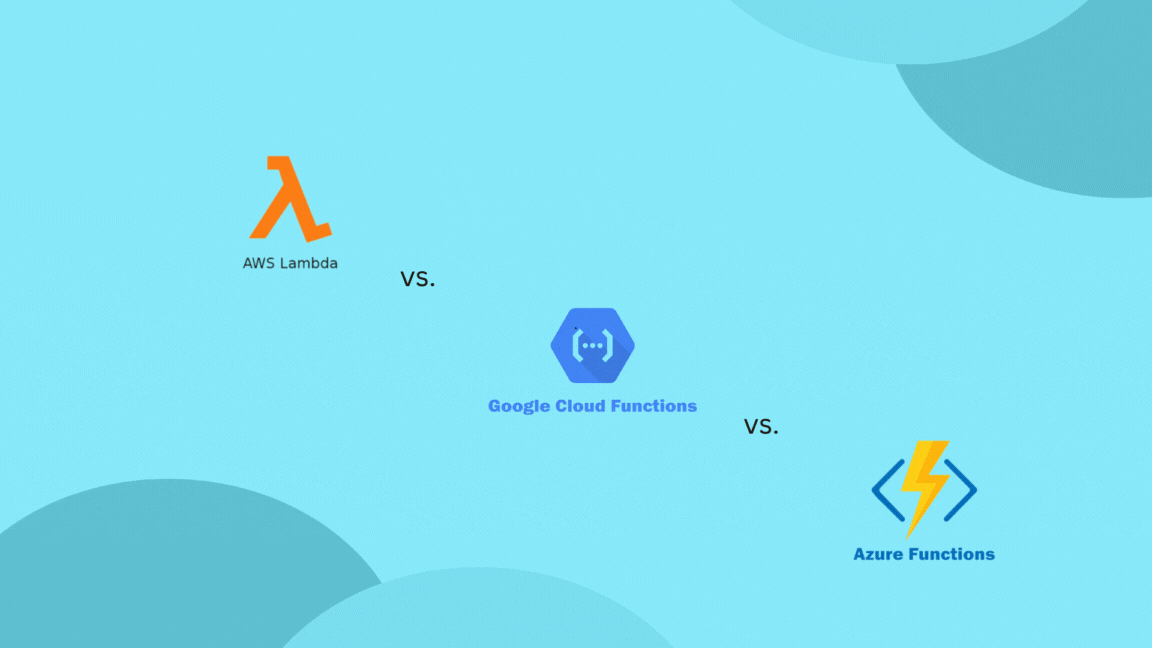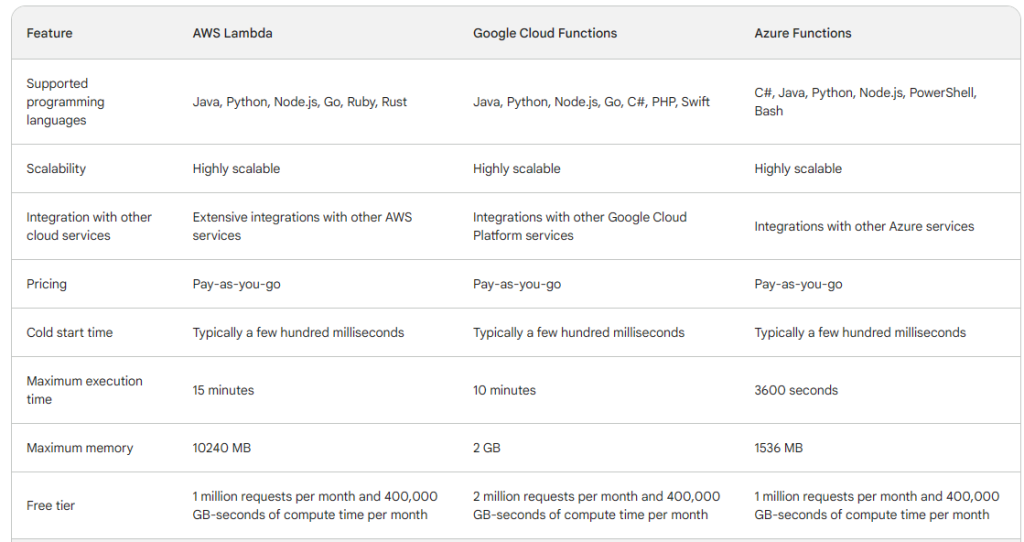
Serverless Computing Showdown: AWS Lambda vs. Google Cloud Functions vs. Azure Functions
In the ever-evolving realm of cloud computing, serverless architecture has emerged as a game-changer, revolutionizing the way developers build and deploy applications. Serverless computing allows businesses to focus on code, leaving infrastructure management to the cloud provider. Three major players in this arena are AWS Lambda, Google Cloud Functions, and Azure Functions. In this showdown, we’ll dissect the offerings of these platforms to help you make informed decisions about which one best suits your needs.
what is serverless?
Serverless allows developers to build and run applications and services without thinking about the servers actually running the code. Serverless services, or FaaS (Functions-as-a-Service) providers, instrument this concept by allowing developers to upload the code while taking care of deploying, running and scaling it. Thus, serverless can help create an environment that allows DevOps teams to focus on improving code, processes and upgrade procedures, instead of on provisioning, scaling and maintaining servers.
AWS Lambda
Serverless Pioneer
AWS Lambda was one of the pioneers in the serverless space, and it has continually evolved since its inception. Here’s what makes it stand out
- Language Support: AWS Lambda supports a wide range of programming languages, making it versatile for developers.
- Integration Ecosystem: AWS Lambda seamlessly integrates with various AWS services, providing a comprehensive ecosystem for building robust applications.
- Granular Billing: You pay only for the compute time consumed, down to the nearest 100 milliseconds, ensuring cost efficiency.
- Event Sources: AWS Lambda supports various event sources, including HTTP requests, S3 events, and real-time data streaming with Kinesis.
- Warm-up Feature: With the provisioned concurrency feature, you can reduce cold starts, ensuring consistent performance.
Google Cloud Functions
Event-Driven Agility
Google Cloud Functions, part of Google Cloud Platform (GCP), offers a unique approach to serverless computing. Here’s what sets it apart
- Event-Driven Focus: Google Cloud Functions is designed for event-driven computing, making it ideal for real-time data processing and microservices.
- Pay-as-You-Go: Like other serverless platforms, Google Cloud Functions bills you per execution, allowing for cost-effective scaling.
- Seamless GCP Integration: If your infrastructure is already on GCP, Google Cloud Functions seamlessly integrates with other GCP services.
- Multi-Language Support: While it started with Node.js, it now supports multiple languages, including Python and Go.
- Cloud Pub/Sub Integration: It excels in handling Google Cloud Pub/Sub messages, enabling powerful data processing pipelines.
Azure Functions
Microsoft’s Serverless Offering
Azure Functions is Microsoft’s answer to serverless computing. Here’s what makes it a strong contender
- .NET Support: Azure Functions excels in providing first-class support for .NET languages, making it the go-to choice for Microsoft-centric organizations.
- Azure Integration: Azure Functions integrates seamlessly with Azure services like Azure Storage, Cosmos DB, and Azure Event Grid.
- Easy Debugging: Debugging is made easy with Azure Functions, thanks to robust tooling and local development capabilities.
- Durable Functions: This unique feature allows you to build stateful serverless workflows, opening up new possibilities for complex applications.
- Hybrid Capabilities: Azure Functions extends serverless computing to hybrid scenarios, allowing you to run functions on-premises or in the cloud.
Comparing AWS Lambda, Google Cloud Functions, and Azure Functions

Additional features and capabilities

Conclusion
On top of its cost saving and maintenance reduction benefits, serverless also encourages correct coding and pushes for effective and fast execution as a result of its pay-per-use model. Organizations aiming at reducing the monthly payment for serverless services must reduce their runtime. Developers who can reduce function run-time and write the smallest independent pieces of code will be able to take greater advantage of serverless and significantly reduce costs for their organization
Ultimately, the Serverless Computing Showdown between AWS Lambda, Google Cloud Functions, and Azure Functions is a testament to the diversity of options available in the cloud computing landscape. By understanding the unique strengths of each platform, you can make an informed decision to propel your serverless journey forward, unlocking the full potential of cloud-based, event-driven computing.


